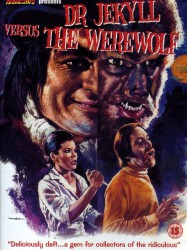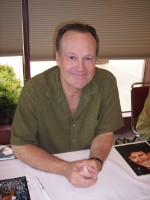Henry Jekyll

- Infos
- Photos
- Meilleurs films
Si vous aimez ce personnage, faites-le savoir !
Dr. Henry Jekyll and his alternative personality, Mr Edward Hyde, is a fictional character in Robert Louis Stevenson's 1886 novella Strange Case of Dr Jekyll and Mr Hyde. Biographie
Dr. Henry Jekyll is a "large, well-made, smooth-faced man of fifty with something of a slyish cast", who occasionally feels he is battling between the good and evil within himself, thus leading to the struggle between his dual personalities of Jekyll and Edward Hyde. He has spent a great part of his life trying to repress evil urges that were not fitting for a man of his stature. He creates a serum, or potion, in an attempt to mask this hidden evil within his personality. However, in doing so, Jekyll transforms into Mr. Hyde, a hideous, evil creature without compassion or remorse. Jekyll has many friends and has a friendly personality, but as Hyde, he becomes mysterious and violent. As time goes by, Hyde grows in power. After taking the potion repetitively, he no longer relies upon it to unleash his inner demon i.e., his alter ego. Eventually, Hyde grows so strong that Jekyll becomes reliant on the potion to remain conscious.Stevenson never says exactly what Hyde takes pleasure in on his nightly forays, generally saying that it is something of an evil and lustful nature. Thus, in the context of the times, it is abhorrent to Victorian religious morality. Hyde may have been reveling in activities that were not appropriate to a man of Jekyll's stature, such as engaging with prostitutes or burglary. However, it is Hyde's violent activities that seem to give him the most thrills, driving him to attack and murder Sir Danvers Carew without apparent reason, making him a hunted outlaw throughout England.
A lawyer named Gabriel Utterson and Dr. Jekyll's butler Mr. Poole end up breaking into Dr. Jekyll's lab. Inside, they find the body of Hyde wearing Jekyll's clothes and apparently dead from suicide. They find also a letter from Jekyll to Utterson promising to explain the entire mystery. Utterson takes the document home where he first reads Lanyon’s letter and then Jekyll's. The first reveals that Lanyon’s deterioration and eventual death resulted from the shock of seeing Mr. Hyde drinking a serum or potion and as a result of doing so, turning into Dr. Jekyll. The second letter explains that Jekyll, having previously indulged unstated vices (and with it the fear that discovery would lead to his losing his social position) found a way to transform himself and thereby indulge his vices without fear of detection. But Dr. Jekyll's transformed personality Mr. Hyde was effectively a sociopath — evil, self-indulgent, and utterly uncaring to anyone but himself. Initially, Jekyll was able to control the transformations, but eventually he would become Hyde involuntarily in his sleep.
At this point, Dr. Jekyll resolved to cease becoming Mr. Hyde. One night, however, the urge gripped him too strongly, and after the transformation he immediately rushed out and violently killed Sir Danvers Carew. Horrified, Dr. Jekyll tried more adamantly to stop the transformations, and for a time he proved successful by engaging in philanthropic work. One day, at a park, he considered how good a person that he had become as a result of his deeds (in comparison to others), believing himself redeemed. However, before he completed his line of thought, he looked down at his hands and realized that he had suddenly transformed once again into Mr. Hyde. This was the first time that an involuntary metamorphosis had happened in waking hours. Far from his laboratory and hunted by the police as a murderer, Mr. Hyde needed help to avoid being caught. He wrote to Lanyon (in Dr. Jekyll's hand), asking his friend to retrieve the contents of a cabinet in his laboratory and to meet him at midnight at Hastie Lanyon's home in Cavendish Square. In Lanyon's presence, Mr. Hyde mixed the potion and transformed back to Dr. Jekyll. The shock of the sight instigated Lanyon's deterioration and death. Meanwhile, Jekyll returned to his home only to find himself ever more helpless and trapped as the transformations increased in frequency and necessitated even larger doses of potion in order to reverse them. It was the onset of one of these spontaneous metamorphoses that caused Dr. Jekyll to slam his laboratory window shut in the middle of his conversation with Enfield and Utterson.
Eventually, the stock of ingredients from which Dr. Jekyll had been preparing the potion ran low, and subsequent batches prepared by Dr. Jekyll from renewed stocks failed to produce the transformation. Dr. Jekyll speculated that the one essential ingredient that made the original potion work (a salt) must have itself been contaminated. After sending Poole to one chemist after another to purchase the salt that was running low only to find it wouldn't work, he assumed that subsequent supplies all lacked the essential ingredient that made the potion successful for his experiments. His ability to change back from Mr. Hyde into Dr. Jekyll had slowly vanished in consequence. Jekyll wrote that even as he composed his letter, he knew that he would soon become Mr. Hyde permanently, having used the last of this salt and he wondered if Mr. Hyde would face execution for his crimes or choose to kill himself. Jekyll noted that, in either case, the end of his letter marked the end of the life of Dr. Jekyll. He ended the letter saying "I bring the life of that unhappy Henry Jekyll to an end". With these words, both the document and the novella come to a close.
The original pronunciation of Jekyll was "Jeekul" which was the pronunciation used in Stevenson's native Scotland. This is also the pronunciation of Gertrude Jekyll.
Joué par les acteurs
Filmographie de Henry Jekyll (5 films)
 , 1h40
, 1h40Réalisé par John Carl Buechler
Origine Etats-Unis
Genres Thriller, Horreur
Acteurs Tony Todd, Tracy Scoggins, Vernon Wells, Danielle Nicolet, Judith Shekoni, Deborah Shelton
Note37%





L'histoire originale de Robert Louis Stevenson est transposée au XXI siècle aux États-Unis.
 , 30minutes
, 30minutesOrigine Etats-Unis
Genres Science-fiction, Fantasy, Action, Horreur, Animation
Thèmes Steampunk
Acteurs Hugh Jackman, Robbie Coltrane, David Wenham, Grey DeLisle, Dwight Schultz, Tara Strong
Note61%





Londres, 1889. Van Helsing, le mystérieux chasseur de monstres, est en mission pour capturer le diabolique Mr Hyde qui sème la terreur dans les rues en assassinant les jeunes femmes à la nuit tombée.
 , 1h15
, 1h15Réalisé par Joe Johnston, Pixote Hunt
Origine Etats-Unis
Genres Science-fiction, Fantasy, Aventure, Animation
Thèmes L'adolescence, Le thème de l'éducation, L'enfance, Magie, La mer, Transport, Pirates, Mise en scène d'un dragon, L'enfance marginalisée, Films pour enfants, Harcèlement à l'école
Acteurs Macaulay Culkin, Christopher Lloyd, Ed Begley Jr., Mel Harris, Patrick Stewart, Whoopi Goldberg
Note61%





Richard Tyler (Macaulay Culkin), un jeune garçon timide, binoclard, très peureux et assez solitaire, est le souffre-douleur de sa ville entière dont tous les autres enfants. Pour se protéger d'un orage, il pénètre dans une bibliothèque déserte et se retrouve entraîné dans un univers animé et féerique sous la houlette du bibliothécaire, M. Dewey (Christopher Lloyd). Dans ce monde surnaturel, les personnages légendaires des classiques de la littérature prennent vie. Richard fait la connaissance du tristement célèbre Dr Jekyll et M. Hyde, rencontre Moby Dick, côtoie les fourbes pirates de L'Île au trésor et affronte un gigantesque dragon cracheur de flammes. Guidé par un trio de livres parlants, l'Aventure, la Fantaisie et l'Horreur, Richard doit vaincre ses pires craintes s'il espère revenir dans son monde.

Dr. Jekyll y el Hombre Lobo (1972)
, 1h36Réalisé par León Klimovsky
Genres Horreur
Thèmes Mise en scène d'un animal, Mise en scène d'un loup, Loup-garou
Acteurs Paul Naschy, Jack Taylor, Mirta Miller
Note56%





Paul Naschy returns as El Hombre Lobo for the sixth time as he searches for a cure to his lycanthropy by visiting the grandson of the infamous Dr. Jekyll. He is given a serum that transforms him into a Hyde-like personality in the hope that it will sublimate his werewolf self, but it results unfortunately in an even more savage monster. The film features a classic scene wherein the wolfman transforms in an elevator, much to the chagrin of a female fellow passenger. Famed Euro-horror star Jack Taylor played Dr. Henry Jekyll.

Dr. Jekyll and Mr. Hyde (1912)
, 12minutesRéalisé par Lucius Henderson
Origine Etats-Unis
Genres Horreur
Acteurs James Cruze, Florence La Badie, Marie Eline, Marguerite Snow, Harry Benham, Jane Gail
Note59%





Le Dr Jekyll aux cheveux blancs s'est secrètement enfermé dans son laboratoire, s'administrant une fiole de formule. Il s'affale sur sa chaise, la tête sur sa poitrine. Alors que le médicament fait lentement effet, une bête aux cheveux noirs, aux griffes et aux deux grands crocs apparaît sur la chaise. Après une utilisation répétée, l'alter ego maléfique de Jekyll émerge à volonté, faisant tomber une petite fille dans la rue et allant jusqu'à assassiner le père de sa petite amie (le pasteur local). La personnalité maléfique retourne en courant au laboratoire pour découvrir que l'antidote est terminé et qu'il devra rester à jamais M. Hyde. Un policier costaud enfonce la porte de Jekyll avec une hache pour trouver le gentil docteur mort d'avoir bu du poison.
 Connexion
Connexion



